Asian Blitz Championship: Ivan Zemlyanskii and Alua Nurman capture titles
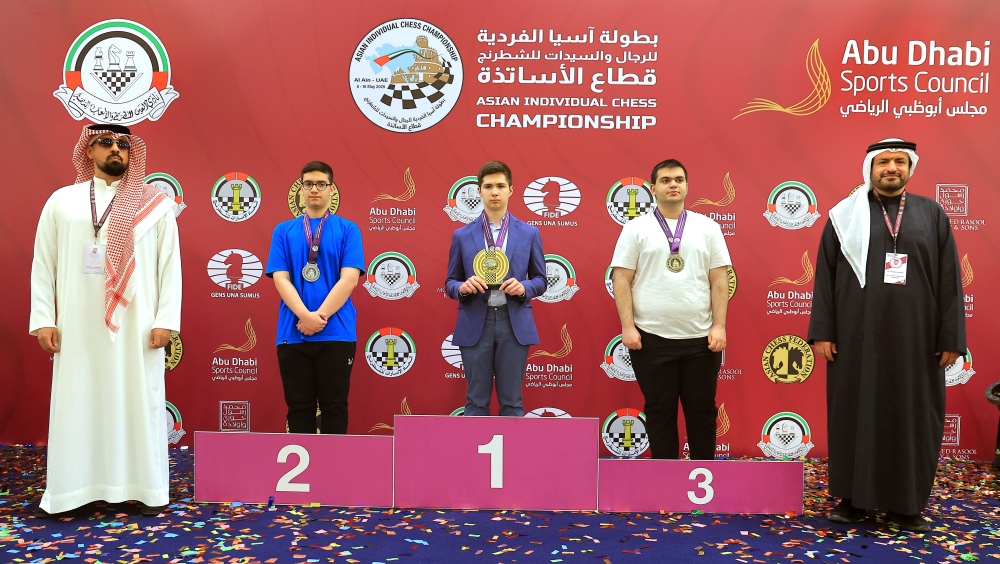
Asian Chess Federation (ACF) president Sheikh Sultan bin Khalifah Al Nahyan (left) awards medals to the winners of the Asian Individual Blitz Chess Championship together with ACF General Secretary Hisham Al Taher (right). Fourteen-year-old Ivan Zemlyanskii emerged undefeated to win the Asian Individual Blitz Chess Championship, held on May 10, 2025, at the Danat Resort Hotel in Al Ain, United Arab Emirates. The teen sensation, playing under the neutral FIDE flag, outpaced 30 grandmasters in a field of 111 players from 25 countries. The tournament was organized by the Al Ain Chess and Mind Games Club under the auspices of the Asian Chess Federation (ACF) and the International Chess Federation (FIDE). Zemlyanskii scored an impressive 8 points out of 9 rounds to take clear first place. He began with five consecutive wins over IM G. Harshavardhan (IND), GM Nikita Matinian (FID), IM Kirill Shubin (FID), eventual runner-up GM Sina Movahed (IRI), and GM Leon Luke Mendonca (IND). After drawing with GM M. Pranesh (IND) in Round 6, Zemlyanskii secured victories against GM Subramaniyam Bharath (IND) and IM Rudik Makarian (FID), and concluded the event with a final-round draw against GM Murali Karthikeyan (IND). Fourteen-year-old Sina Movahed of Iran scored 7.5 points to finish alone in second place. IM Rudik Makarian (FID) placed third with 7 points, edging out GM Karthikeyan, IM Saha Neelash (IND), and untitled Jiang Haochen (CHN) on tiebreaks. Zemlyanskii earned $2,500 for first place, while Movahed and Makarian took home $1,500 and $1,000, respectively. Complete final standings – Open In the women’s section, WGM Alua Nurman of Kazakhstan clinched the title with 7.5 points, edging out runner-up GM Valentina Gunina (FID) on the basis of a superior opponents’ average rating. IM Song Yuxin of China placed third with 7 points, finishing ahead of IM Rout Padmini (IND) and WFM Elnaz Kaliakhmet (KAZ) on tiebreaks. Asian Chess Federation (ACF) president Sheikh Sultan bin Khalifah Al Nahyan (left) awards medals to the winners of the Asian Individual Blitz Women’s Chess Championship together with ACF General Secretary Hisham Al Taher (right). The women’s field featured 86 players from 20 countries, including 2 GMs, 15 WGMs, 11 IMs, and 20 WIMs. Nurman won six consecutive games against compatriots WIM Ayaulym Kaldarova and WIM Assel Serikbay, WIM Sakshi Chitlange (IND), Madinabonu Khalilova (UZB), GM Valentina Gunina (FID), and Bat-Erdene Mungunzul (MGL), then drew with IM Leya Garifulina (FID) in Round 7. Despite a penultimate round loss to IM Song Yuxin (CHN), Nurman secured the title with a final-round victory over compatriot Xeniya Balabayeva. Nurman received $1,500 for her win, while Gunina and Song earned $1,000 and $500, respectively. Complete final standings – Women A total of $80,000 in cash prizes is at stake in the 2025 Asian Individual Chess Championship. The top ten men qualify for the FIDE World Cup, while the top two women earn spots in the FIDE Women’s World Cup. Classical games are scheduled daily at 3 p.m. until May 15, with the final round beginning at 10 a.m. Watch live games in Chess.com, Lichess, Chessbase (Men) and Chessbase (Women). Photos: Hossam El Baz Official website: asianchess.com/
FIDE WGP Austria: A hat-trick for Zhu Jiner after stunning Vaishali Rameshbabu
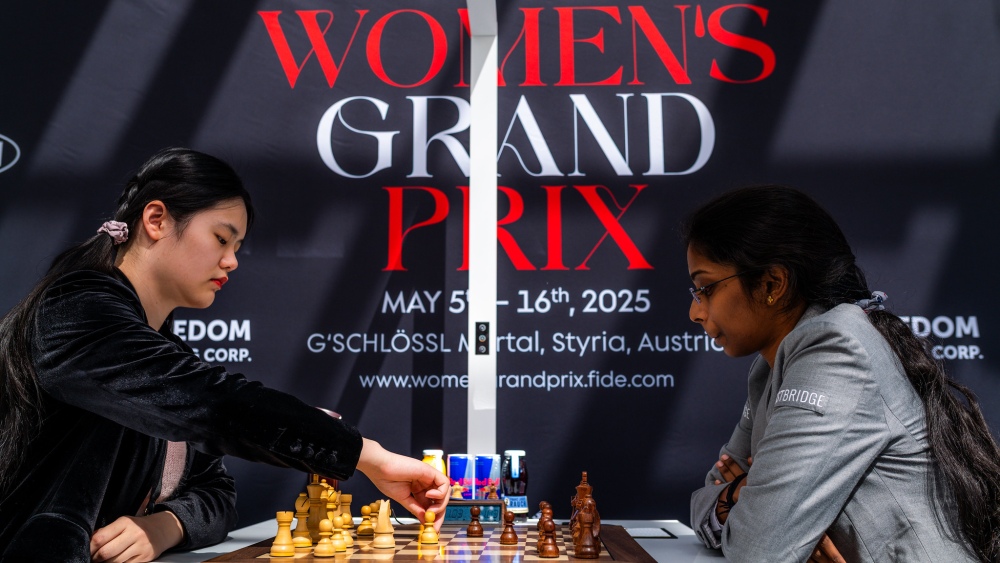
Zhu Jiner scores her third straight win. Muzychuk holds lead despite missed chance. Bulgaria’s Nurgyul Salimova clinches her first victory, stunning Alexandra Kosteniuk in just 25 moves. Round five marked the halfway point of the final tournament in the 2024/2025 FIDE Women’s Grand Prix. Anna Muzychuk remains in sole lead on 4/5, despite missing a chance with the black pieces against Tan Zhongyi. Zhu Jiner caught up with Vaishali Rameshbabu on 3/5 after a sharp victory, while Nana Dzagnidze also joined the tie for second following a draw with Mariya Muzychuk. Lela Javakhishvili outplayed Olga Badelka and now shares 2.5 points with Tan. Bulgaria’s Nurgyul Salimova fought back from a weaker position against Kosteniuk to score her first victory. Both now sit on 1.5/5. After four days of rain and overcast skies, the sun finally broke through over the Austrian highlands surrounding G’Schlössl Murtal. The usual silence of the chess hall was broken by the birdsong in the background, making it seem the games were being played in a park rather than indoors. The main two matchups were between the tournament leader Anna Muzychuk and former World Champion Tan Zhongyi, as well as, the duel between Zhu Jiner and Vaishali Rameshbabu. Zhu Jiner and Anna Muzychuk are the only two who have a chance to win the overall WGP Series. To qualify for the Candidates and win the WGM season, Anna needs to be in sole first place in Austria. This means getting every point she can, including against Tan. In the Giuoco Piano, in which Muzychuk played as Black, things were calm until she suddenly got a sizable advantage in a complicated middlegame. This was the best position Black got in the game before she spilled the beans. The best choice for Black was to centralise the knight with 18…Ne5! attacking the queen. This forces White to take the knight and leave Black dominating the centre, or to remove her queen from the attack, opening space for the d-pawn to further penetrate White’s defences. Instead, after seven minutes of thinking, Anna played 18…d5? However, after 19.cxd4 Nxe4 20.Bxd5 Nb4? (20…Nxg3 with a slightly better position for Black) 21.Qb3 Nxd5 22.Nxe4 Bxe4 23.Qxd5! forcing the exchange of queens, 23…Bxd5 24.Rxe7 White emerged slightly better. The game continued and was the last to finish with a draw. Anna Muzychuk left the playing area clearly angry with herself for missing an opportunity. Despite this, she maintained her sole lead with 4/5, a point ahead of the rest. After a poor start with two defeats, Zhu Jiner bounced back with two victories. In round five, she was facing Vaishali Rameshbabu, who has, until this game, had two victories and two draws. The young Indian hope surprised her opponents in three out of four games played, building an image of a very uncomfortable player. In the Four Knights of Sicilian Defence, she was surprised by Zhu and spent a lot of time thinking, entering time trouble early in the game. Despite losing a pawn, Vaishali managed to hold by move 30, and then all fell apart. In time trouble, instead of 30…gxf5 Vaishali played 30…Qc2?? Allowing White to exchange the queens and enter a winning rook endgame. 31.Qxc2 Rxc2 32.f6! sealing off the black king. 32…h5 33.Rd1 Re2 34.Rd8+! And now White has penetrated Black’s back ranks. 34…Kh7 35.Rf8 Rxe5 36.Rxf7+ Kh6 37.Rxa7 Zhu has two more pawns and a runner on the a-file and nothing can stop that. An excellent performance by Zhu. After starting with two losses, she scored three consecutive victories – a great feat in a field of strong players. This game was the first major setback for Vaishali in Austria, as she remains on 3/5. In the second game with the Queen’s Gambit Declined, Women’s World Champion Alexandra Kosteniuk surprised her opponent, Nurgyul Salimova, by playing 1.d4. The former women’s world champion managed to gain the upper hand after an early break in the centre. By move 15, White gained an extra pawn and had a significant advantage. Black just lost a pawn defending the king’s fortress. In this sharp position, instead of 16.0-0! (intending to meet 16…Nxd5 with 17.Rd1), Alexandra played the natural but errouneous 16.Be4, which allowed Black counterplay with 16…f5 17.Bd3 Qxd5? regaining the lost pawn but 17…c4! was much stronger. 18.Rb1? Ra5 and now after 18…c4! 19.Be2 f4! 20.Qd1 Qa5+ 21.Kf1 the tables have completely turned: Black has space and initiative, threatening White from the centre, while Kosteniuk’s pieces are pushed back and pinned, the rook on h1 trapped, and the king not fully secure. The former Women’s World Champion tried to resist but resigned on move 25. This was the shortest game in the tournament so far, ending in a victory. This was the first win for Nurgyul Salimova in the tournament, after one draw and three defeats. Clearly pleased, in the post-game interview, she noted that thanks to the sunny weather, she “already felt positive vibes” even before the game. Austria’s Olga Badelka started losing her way in the early stages of the Queen’s Gambit Declined against Georgian Lela Javakhishvili. Playing as White, Olga pressed on the kingside, but Lela made sure she was in time to react and hold everything under control. By move 22, Black was dominating. It was obvious Javakhishvili was at ease with her position and performance – she spent a lot of time outside, enjoying the park in which the playing venue is located, while Badelka was glued to her seat for most of the game. On move 32, Black correctly sacrificed an exchange, which was the shortest way to victory. Badelka resigned on move 42, after nearly three hours of play. With 2.5 points, Javakhishvili is on 50%, while Austria’s Badelka has two victories and three losses. Mariya Muzychuk and Nana Dzagnidze drew in the Sicilian. Surprised by 7.c3 in the Moscow Variation, Dzagnidze ended up with doubled pawns on the e-file, but generated enough counterplay to hold a draw. She remains unbeaten with one win
FIDE WGP Austria: Anna Muzychuk takes the lead in a round of pawn sacrifices
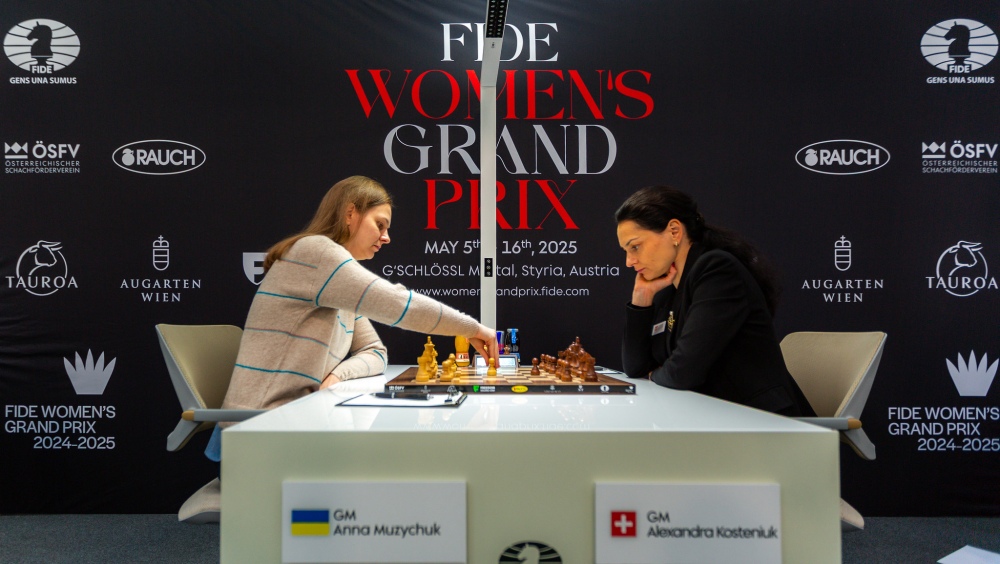
Ukrainian Anna Muzychuk had a great showing against the former Women’s World Champion Alexandra Kosteniuk, taking her to 3.5/4 and a sole lead in the tournament. Out of five games, three saw players making or offering a pawn sacrifice. Round four of the final stage of the 2024/2025 FIDE Women’s Grand Prix was marked by fast games and questionable pawn sacrifices. As it turned out, those who accepted the pawn offer – such as Dzagnidze (playing as White against Tan) and Badelka (playing as Black against Salimova), won. Vaishali Rameshbabu, who declined a free pawn from Mariya Muzychuk, was left defending a draw. Nana Dzagnidze’s game against former Women’s World Champion Tan Zhongyi stood out with its sharp moves and impressive tactics. After securing a win as White, Nana is now alone in third place. Meanwhile, fellow Georgian Lela Javakhishvili blundered an even endgame and lost to Zhu in a match everyone thought would be the first to finish in a draw. In the matchup of the day, Alexandra Kosteniuk launched an early surprise against Anna Muzychuk by essaying the French Defence. However, in the Winawer Variation, Muzychuk staged her own surprise with an early 5.Qg4. On move six Alexandra deviated from the most popular continuations and opted for 6…d4, a move rarely seen at the top level. Just two three moves down the road, after a 25-minute think, Kosteniuk made a serious error, playing 9…Nd5? Black should have continued by taking on c3, doubling White’s pawns and then take on e5. Another alternative for Black to consider was 9…b5 which looks even stronger. As played, White got a chance to pin Black’s pieces and develop at the same time: 10.Bd2 Nxc3 and now, an important intermezzo 11.Rc1! After 11…Bxc3 12.Bxc3 Qb6 targeting f2, Anna responded with 13.Qf4! defending f2 and preserving an extra pawn. After exchanges on the queenside, the two soon transitioned to an endgame with rooks and queens. This is the last moment in the game where Black had a chance to put up a stronger resistance. Instead of 27…f5 Alexandra played 27…Rg5? This allowed White to proceed with coordinating her rooks and executing an exchange in the centre after which she was completely winning. 28.Re4! Kb8 29.g3 a5 30.Rec4 Qb6 31.Rd4! Rf5 32.Qd2 Rfxe5 33.Rxe5 Rxe5 34.Rxg4 Rd5 35.Rd4 Rxd4 36.Qxd4 Qxb2 37.Qd8 – White’s queen is completely dominating, and her king is well protected. The situation is opposite for black. On move 46, Kosteniuk surrendered. An extremely important victory for Muzychuk who ended as the sole leader in the tournament, while Kosteniuk remains on 1.5/4. The most beautiful game of the day was one between Nana Dzagnidze and Tan Zhongyi. In a solid and well-known line of English Opening, Dzagnidze pressed on the queenside while Tan countered in the centre. After erroneously trading the light-square bishops, Tan was all but forced to sacrifice a central pawn, which opened space for her rook to join an attack on the white king’s fortress. Black got her rook into the game and is now going all in, trying to stun White. She just played 21…g5 22.g4! The only move! What is unusual is that this move defied conventional wisdom – don’t open your king’s fortress, let alone do that while at the same time giving up the pawn!? And while this all is true and that is exactly what Nana did in this position, also – she is opening the g-file for her own attack on Black! 22…Qxg4+ 23.Kh1 Kg8 and now comes another deep move by Dzagnidze – 24.Bh8! Tan’s position is extremely difficult to defend and in a few moves, the former World Champion was completely lost. After three long draws, a well-earned win for Dzagnidze, now on 2.5/4. Tan, after starting with two wins, has now lost two in a row and is on 50 percent. Olga Badelka also scored, beating Nurgyul Salimova. In a well-known line of the Italian, playing as White, Salimova went for a position with an isolated pawn in the centre. She soon gave up that central pawn and got almost sufficient compensation in the form of two bishops. Following a tactical battle in the centre around moves 19-25 Salimova got back into the game. The position was equal but, under time pressure, Salimova made a mistake by allowing Black to penetrate her back ranks with 28…Qe2, which led to White’s demise. An important comeback for Badelka following two loses. She is now on 2/4. Salimova continues her winless streak, with 0.5/4. Vaishali Rameshbabu has managed to stage surprises in all three previous games. This time around, playing against Mariya Muzychuk, the Indian seems to have been the one who was surprised as she decided not to play the most obvious move. In a popular line of the Sveshnikov Sicilian, Vaishali had an early chance to pick up a pawn but did not go for it. Vaishali spent just under 30 minutes thinking before deciding not to take the free pawn (which was the strongest continuation) but played 16.Ne3 instead. This allowed Mariya Muzychuk to equalize first and then to grab the initiative. Despite pressing hard on the queenside and pushing White’s pieces back, Mariya surprisingly decided to settle for a draw by a threefold repetition. This is the second time in the tournament (previously it was against Salimova), that Muzychuk opted not to press. Vaishali is on three points, just half a point behind the leader, Anna Muzychuk. The former world champion Mariya Muzychuk is on 1.5/4, with one loss and three draws. The game between Javakhishvili and Zhu Jiner looked set to end quickly in a draw, but instead turned into the day’s longest battle. White (Javakhishvili) emerged slightly better in a well-known line of the Queen’s Indian Defence, but the position was largely even. The first big swing happened late in the ending, when Javakhishvili made a grave mistake that cost her game. Black just moved her king to g6. In this position, White should have just
GM Christopher Yoo temporarily suspended by FIDE Ethics and Disciplinary Commission

The FIDE Ethics and Disciplinary Commission (EDC) has announced a provisional 60-day suspension of Grandmaster Christopher Yoo, effective from May 9, 2025. This action follows the submission of a second complaint alleging harassment, currently under preliminary review. The suspension stems from two separate complaints alleging violations of the FIDE Ethics and Disciplinary Code. Case 5/2025 (A), filed by the United States Chess Federation (USCF), and an additional recent complaint – whose details and complainant remain confidential due to the sensitive nature of the allegations – are both under investigation by the EDC. On November 14, 2024, the US Chess Federation imposed a one-year ban prohibiting GM Christopher Yoo from participating in tournaments under the auspices of USCF. This sanction also includes a five-year probationary period extending through November 14, 2030. Under Article 26.12 of the FIDE Charter, national sanctions may be extended internationally if a member federation requests it and if the decision complies with fundamental legal principles and fair trial standards. In line with this, the USCF formally submitted a request for FIDE to recognize and globally enforce its ban, pursuant to Article 4.15 of the FIDE Ethics Code. This request remains under investigation. Given the gravity of the allegations and the ongoing proceedings, the Chair of the EDC has enacted a temporary suspension of GM Yoo to safeguard the integrity of the investigative process. Both GM Yoo and the USCF have been formally notified of this decision. The suspension may be extended if a final resolution is not reached within the initial 60-day period. This decision aligns with FIDE’s commitment to safeguarding everyone involved in chess and sends a clear message about the importance of fostering a respectful environment for the entire chess community, regardless of gender, age, or status.
Balancing moves and motherhood: ChessMom initiative continues

On the occasion of Mother’s Day, FIDE and the Women’s Commission express appreciation for the many women who contribute to the chess world while also raising families. Balancing the responsibilities of motherhood with a professional chess career is no easy task, and we acknowledge the dedication, strength, and perseverance of these remarkable players. In this spirit, FIDE is proud to announce the return of the ChessMom project for the 2026 Chess Olympiad in Uzbekistan. This initiative reflects FIDE’s continued dedication to supporting women in chess, particularly those who are mothers or expecting. Following overwhelmingly positive feedback from participants during the 2024 Chess Olympiad in Hungary, the ChessMom project will not only continue but expand, ensuring that more players can pursue their chess ambitions without having to choose between career and motherhood. In 2024, six mothers were selected for the inaugural program: Alina Kashlinskaya (Poland) Nana Dzagnidze (Georgia) Yuliia Osmak (Ukraine) Aster Melake Bantiwalu (Ethiopia) Rauha Shipindo (Namibia) Nolwazi Nkwanyane (Eswatini) These players participated in the Olympiad with the support of the ChessMom initiative, which covered the cost of an accompanying caregiver, allowing the players to focus on their games while ensuring their children were cared for. One of the most inspiring stories came from Rauha Shipindo, a Namibian player who competed in her national qualifier just two weeks before giving birth, and then went on to represent her country at the Olympiad, accompanied by her baby and a caregiver. “I am so grateful to those who initiated the ChessMom program. It is trying to close the gap that is there for women. If I have a newborn like this, I might weigh in and say, will I stay to look after my little one, or will I go to the Chess Olympics? So it’s combining that gap and closing it,” Rauha Shipindo said. For Rauha, ChessMom was more than logistical assistance – it was the chance to compete at the highest level without sacrificing her role as a new mother. The program provides financial support to players with infants under one-year-old, allowing them to travel with a companion who can care for the child during competition. As Dana Reizniece, Deputy Chair of the FIDE Management Board, explains: “I think it is important that women in chess feel supported. We cannot take all the barriers for women away, but with programs like ChessMom we want to help professional chess players to balance their career and personal life.” Francisco Javier Cruz Arce, member of the FIDE Women’s Commission and project co-initiator, reaffirms this mission: “We are committed to ensuring that no woman is forced to choose between motherhood and her professional career as a chess player. We are happy that ChessMom continues to grow, raise awareness, and expand. We want mothers who play chess to know that they will not be alone. FIDE is here to support them every step of the way.” The idea for ChessMom was conceived during the 2022 Olympiad in Chennai. Reflecting on its origins, Anastasia Sorokina, Chair of the FIDE Women’s Commission, shared: “The idea for this project was born during the Olympiad in Chennai. While discussing with commission member Francisco Cruz, we spoke about the clear need for such support. For many women chess players who are planning to become mothers, the fear of pausing or ending their professional careers is very real. ChessMom addresses that directly — showing that it is possible to be both a mother and a competitive chess professional. This initiative is more than logistical support; it is a message that women do not have to choose between motherhood and ambition. It gives hope, security, and dignity to women at a critical moment in their lives.” This announcement is a message to all players who are new or expecting mothers: your place in the chess world is secure and celebrated. FIDE encourages you to prepare for participation in your national teams for the 2026 Chess Olympiad. Application details for the next edition of ChessMom will be shared in the coming months.
FIDE WGP Austria: Anna Muzychuk and Vaishali share the lead after Round 3
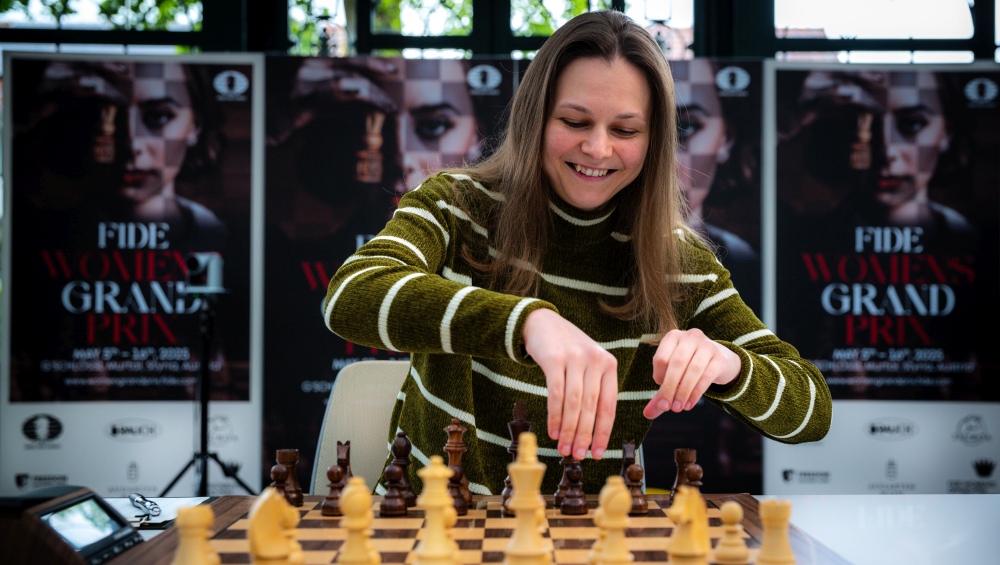
It was a decisive day in Austria, with four of five games ending in victory. Anna Muzychuk defeated Olga Badelka with black pieces, joining Vaishali in shared first after the Indian comfortably drew with Nana Dzagnidze. Alexandra Kosteniuk stopped Tan Zhongyi with a confident performance, while Zhu Jiner bounced back from the bottom, defeating Nurgyul Salimova. Mariya Muzychuk had a poor showing against Lela Javakhishvili and lost. Tension and drama defined the third day of the final (sixth) leg of the 2024/2025 FIDE Women’s Grand Prix. Three of the five games featured opposite-side castling – often a sign that both sides are ready for a fight. The first to score was Lela Javakhishvili from Georgia, who extended her unbeaten streak in classical chess against the onetime Women’s World Champion, Mariya Muzychuk. The younger Muzychuk sister had a shaky showing. In the Giuoco Piano, a line Mariya usually handles with precision – she faltered, allowing Black to seize the initiative and settle into a comfortable position. By move 20, Muzychuk’s pieces were uncoordinated and vulnerable to tactical threats. She soon lost a pawn and was down to under three minutes by move 25. Lela had a winning advantage, which she went on to convert without much difficulty. In the post-game analysis, Lela expressed surprise at some of Mariya’s choices, noting that she may be an uncomfortable opponent for the Ukrainian. (According to the chessgames.com database, Javakhishvili has beaten Mariya Muzychuk four times, with seven draws and no losses in classical games.) This win was a crucial bounce-back for Javakhishvili after her round-two loss to Vaishali. She now stands at 1.5/3. With two draws and a loss, Mariya Muzychuk has one point. India’s Vaishali Rameshbabu continued her strong performance. She surprised Nana Dzagnidze with an early queen capture on d4 in the Sicilian. After a complex middlegame, the position simplified into an even endgame, with Black exerting pressure in the center. A draw was agreed on move 40 following a threefold repetition. With 2.5/3, Vaishali maintains her excellent form and shares first place. After two frustrating draws marred by missed opportunities, Nana finally had a shorter, less taxing game, finishing day three with 1.5 points. Olga Badelka chose an unusual approach in her game against Anna Muzychuk, starting with the 1.Nf3. However, the position transposed into a rare line of the Sicilian with b3. Despite the surprise, Badelka emerged slightly worse from the opening. Still, she played bravely, looking for chances and nearly equalized, but a slip in the middlegame handed Muzychuk the initiative that gradually grew as the game progressed. The Ukrainian eventually ended a pawn up in the centre. Despite the fact that losing that pawn gave White space to counter, Badelka missed her chances. The two transitioned to an endgame with minor pieces where Black had an extra pawn and a commanding position. Staying calm, Anna completely dominated in the endgame, claiming victory on move 50. This put Anna Muzychuk in shared first place – a place where she needs to be if she is to stand a chance to win the 2024/2025 FIDE Women’s Grand Prix season and qualify for the Candidates. Badelka is on one out of three, having suffered two consecutive losses. The last two games to finish, both culminated in a queen endgame. The clash of former Women’s World Champions, Kosteniuk and Tan, progressed rapidly. In the classical line of the Queen’s Gambit Exchanged, neither player gained a clear edge. However, following exchanges in the center, Black lost her way. In this position, Tan has just put her rook on e5, to prevent Qd5 and an exchange of queens (the reserved 23…Qf8 with the same idea is much better). The move played by Tan allowed Alexandra to pin the knight and increase her control over the center, getting the upper hand. 24.Rc1! Rce8 25.Qd4 The knight is hanging and doesn’t have a good place to go. Tan chose the lesser of two evils – 25…Nd3 – giving up a pawn to avoid entering a passive position. Further exchanges followed, and the two ended up in a queen endgame where Kosteniuk was a pawn up and had a better structure. Soon, she collected another pawn. But Tan wasn’t giving up, despite being completely lost. As Kosteniuk noted after the game, “the queen endgames are very hard to win” given chances of overlooking perpetual checks or even losing the queen if you miss an attack via a line or a diagonal. Despite a bit of shaky play towards the end, Kosteniuk kept her cool and converted her advantage into a full point. A great achievement by Kosteniuk (now on 1.5/3) who came back by defeating one of the leaders and the highest-rated player in the event. However, another tough task lies ahead for Kosteniuk as she will be playing as Black in round four against one of the leaders – Anna Muzychuk. The last game to finish was one between Zhu Jiner and Nurgyul Salimova. In one of the main lines in the Petroff, Zhu castled long, opposite to her opponent, signaling she was ready for a fight. Soon, Zhu sacrificed a pawn to launch an attack on the kingside which lead to a very sharp position. Here Zhu played 24.Nxc5 – attacking the queen but leaving two pieces hanging. Nurgyul found the best move 24…Qf7 to which the Chinese reacted with 25.Ne4. If 25…gxf4 White takes the pawn on h4 and is threatening mate on h8, leading Black into a very uncomfortable position. Instead, 25…Rxe4! (25…Qa2 was another interesting option), sacrificing a rook for a very dangerous knight and also opening the space for Black to mount her own attack. 26.fxe4 Qa2 27.b3! Preventing Nc4. 27…Rc8 28.Rd3 – Very precisely played by Zhu. Now, however, instead of the only move maintaining the balance, namely 28…d5! Salimova made a fatal mistake, taking the bishop with 28…gxf4? After 29.Qxh4 White is winning. Zhu ended with three pawns for a knight but a dominating position on the board,
FIDE WGP Austria: Vaishali and Tan take the lead in a round full of comebacks and collapses
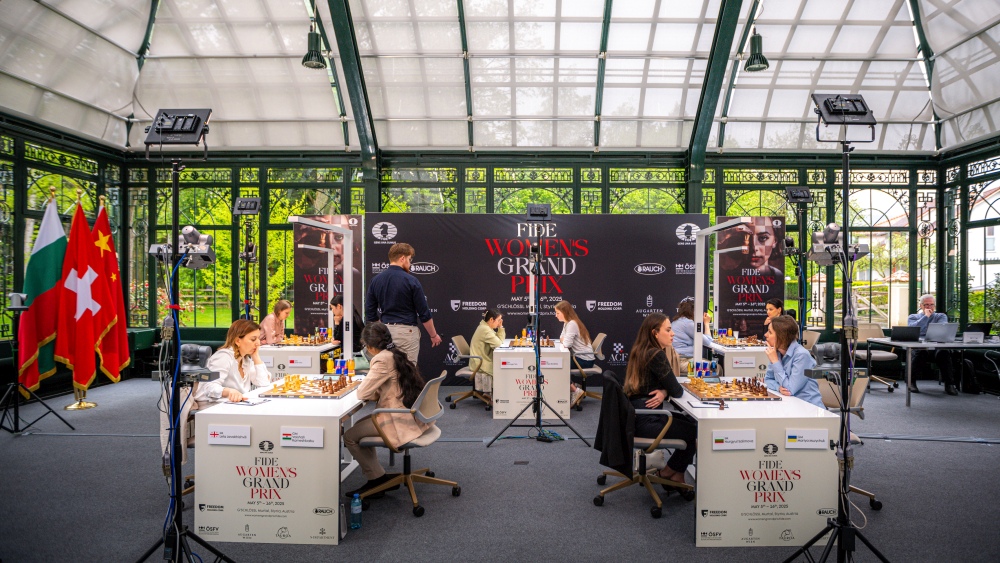
Playing with black pieces, Indian superstar Vaishali Ramesbabu defeated Lela Javakhishvili. Tan Zhongyi staged a second straight comeback, defeating Olga Badelka. In a direct clash between two top contestants, Anna Muzychuk defeated Zhu Jiner and is now in sole third place, on 1.5 points. Round two of the final leg of the 2024/2025 FIDE Women’s Grand Prix (WGP) again saw sudden swings across the boards. Vaishali Rameshbabu delivered the round’s steadiest performance, keeping a strong grip on the game after surprising Javakhishvili with a Reverse Grunfeld. Vaishali steadily increased her pressure on White. Despite putting up stiff resistance, Javakhishvili finally broke and surrendered after 39 moves. In the second decisive game of the day, Tan Zhongyi had a lucky break against the young Austrian representative, Olga Badelka. Despite playing with the white pieces, the former Women’s World Champion erred early on in the game and exposed herself to a devastating attack. Luckily for her, Badelka hesitated at the critical moment. Despite being low on time, Tan managed to turn the tables on Badelka and emerge victorious. It’s the second game in a row (after defeating compatriot Zhu Jiner in round one) that Tan managed to make a comeback from an inferiour position. The longest game of the day, lasting five hours, was played between Anna Muzychuk and Zhu Jiner. This was an early duel between the top two contestants in the event, who have a chance to win the tournament and the overall Grand Prix. Zhu surprised Muzychuk in the Ruy Lopez but faltered in the middlegame. Despite mutual inaccuracies, Muzychuk capitalised on a late mistake to win a key game. The Ukrainian is now in third place with 1.5 points, while Zhu is in sole last, as the only player with no points after two rounds. It was another frustrating round for Dzagnidze, who, as in round one, built up pressure before squandering it. In the English Opening, Nana (playing as White) gained an advantage, and then misplayed and threw it all away. Kosteniuk also had her chances, but – like Nana – also threw them out of the window. Nana is now on one point, while Kosteniuk is on half. Mariya Muzychuk held a slight edge against Nurgyul Salimova on the black side of the Sicilian Rossolimo but chose not to press in the opponent’s time trouble, settling for a draw. Here’s a closer look at the round-two games: Nana Dzagnidze – Alexandra Kosteniuk, ½-½Following a shocking loss on the opening day of the tournament, former Women’s World Champion Alexandra Kosteniuk faced Nana Dzagnidze. In the English Opening, Dzagnidze handled the position with greater accuracy and soon held a slight edge. As the game went on, she took full control of the center and gained dangerous initiative. White’s pieces were more coordinated and active. Black needed counterplay and found it in an exchange sacrifice, although it did not offer sufficient compensation. 20…Rxf4 21.gxf4 Nd4 22.Nxd4 Qxd4 23.Be4 – the first imprecision by White. 23.Rae1 was better. To make things even worse, few moves down the road Dzagnidze made an error and gave up her advantage. 27.d4?? Entering a sequence after which Black got dangerous counterplay. 27…Qxf4 28.Bxh7 Nxh7 29.dxc5 Qg4! Now Black is asking questions around the white king and will soon activate her c8 bishop, posing serious threats. Nana defended herself the only way she could. Soon, the queens were off the board and the position was even. But Kosteniuk started to err again, allowing Dzagnidze a second chance – which the Georgian took. Move by move, Dzagnidze’s position improved—until she stood on the verge of victory. But now Nana returned the favour and let it slip: Nana should have proceeded with 66.Rf7+ Kd6 67.h5. Instead, she first pushed the h-pawn 66.h5??, throwing a lifeline to Kosteniuk. 67…Ne4+! The point is that after 68.Rxe4 Bxe4 69.hxg6 Rg1+ 70.Kf4 Bxg6! White wins a piece but Black trades the rooks and is right on time to eliminate White’s last pawn – 69…Bxg6 70.Rxg6 Rxg6 71.Nxg6 b5 72.cxb5 Kb6. Neither player was happy with the way they played this game. Tan Zhongyi – Olga Badelka, 1-0 This was a clash between two winners from day one. Former World Champion Tan was up against Austria’s Olga Badelka who made a comeback on day one against Alexandra Kosteniuk. There was psychological play from move one, as both sides spent a long time thinking how to respond to lines which they were surely prepared for. In the French Defence, both sides played reasonably well until the following position: After five minutes of thinking Tan blundered with 15.Qd2?? White was now lost after 15…Rxf3! (a common motif in this position) 16.gxf3 Qxh2+ 17.Kf1 Nce5. However, Badelka missed this golden opportunity and opted for the insipid 15…Bd7? Tan sank into deep thought, spending 21 minutes before playing 16.h3. Badelka now took on f3: 16…Rxf3 17.hxg4 Rf4, but it was not nearly as strong as on the previous move. In subsequent play, the evaluation changed several times as the opponents traded inaccuracies and eventually reached the last critical position of the game. Tan won a pawn and reactivated her pieces. Badelka was now under pressure. She paused again — and then made a catastrophic blunder. Instead of going for a secure line with 38…g6 39.Rf4 a3 40.c4 g5, Badelka made a fatal error: 38…a3?? overlooking the threat of mate. After 39.Ne7+ Black had to give up an exchange to avoid being mated on the h-file (39…Kh8/h7 40.Rh5#) 39…Rxe7 40.Rxe7. Tan reached the first time control and smoothly converted her material advantage 16 moves later. Anna Muzychuk – Zhu Jiner, 1-0 This was the heavyweight clash of the round. Two favourites for the event and the Grand Prix title squared off in round two. Unlike Anna Muzychuk, who had an easy first day with a quick draw against her sister, Zhu lost her game in round one after defending a very weak position against Tan for more than five and a half hours. In the
Aleksandar Indjic wins Baku Open 2025
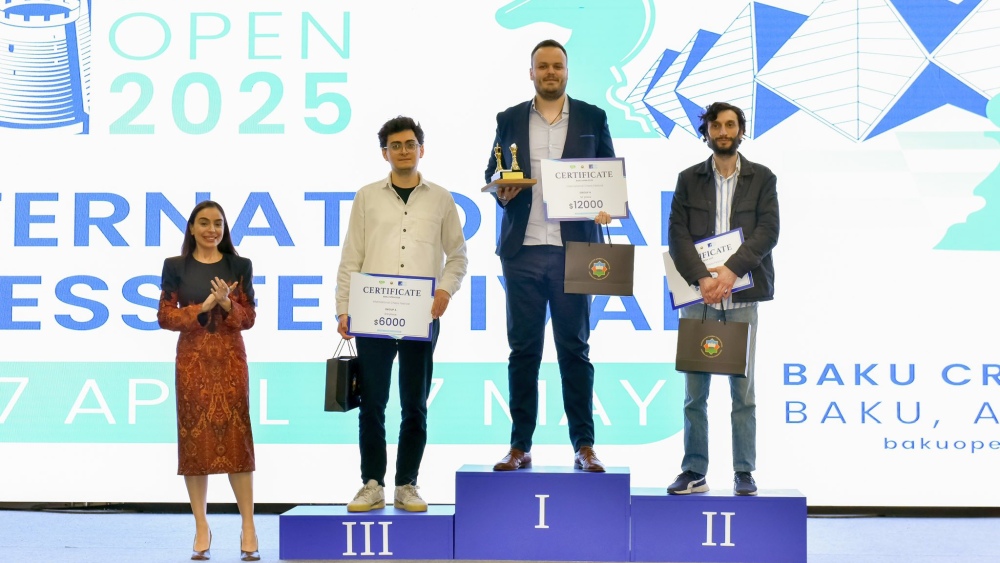
GM Aleksandar Indjic (Serbia) emerged as the sole winner of the 2025 Baku Open (Group A), confirming his status as the pre-tournament favorite. The 2025 Baku Open international festival featured three tournament sections—Groups A, B, and C—all 9-round Swiss tournaments with classical time control. Nearly 700 players representing 16 national federations participated. The total prize fund was $55,000, with $12,000 awarded to the winner of Group A. Home player and fifth seed Mahammad Muradli took an early lead by winning four consecutive games. However, in Round 5, top seed Indjic defeated him in a pivotal match to seize the lead—a position he maintained until the end. The 2024 European Champion, Indjic, completed the event unbeaten, clinching the title with an impressive score of 7/9. Baadur Jobava (Georgia), who also remained undefeated, and Vahap Sanal (Turkey) finished just half a point behind the champion, tying for second place. Jobava claimed silver based on the higher average rating of his opponents. Nikoloz Chkhaidze (Georgia) won the Group B tournament, while Akbar Mirzayev (Azerbaijan) edged out four competitors to secure the Group C title on tiebreaks (Buchholz system). Final standings (Groups A, B and C) The closing ceremony of the International Chess Festival “Baku Open 2025,” organized with the support of the Azerbaijan Chess Federation and the Ministry of Youth and Sports, featured several distinguished guests. These included Vice President of the Heydar Aliyev Foundation and Head of the IDEA Public Union Leyla Aliyeva; Assistant to the President of Azerbaijan Anar Alakbarov; Head of the Department of Youth Policy and Sports Affairs of the Presidential Administration, Assistant to the First Vice President Yusuf Mammadaliyev; Minister of Youth and Sports Farid Gayibov; FIDE’s 6th President Kirsan Ilyumzhinov; President of the Azerbaijan Chess Federation Mahir Mammadov; and other honored guests. After the announcement of the final results, top finishers in each category were awarded. Nazli Rustamli and Daniel Konovalov took first place among girls and boys under 8 years old, respectively. In the under-10 category, Yang Youping (China) and Yusif Ahadzadeh topped the rankings. Asnad Bakhshizadeh and Akbar Mirzayev secured first place among players under 12. In Group B, Dinara Huseynova (women) and Nikolaz Chikalidze (Georgia) topped the standings. Roman Shogdziyev (FIDE) was recognized in the U-16 category. In Group A, Ayan Allahverdiyeva (Azerbaijan) and Aleksandar Indjic (Serbia) were crowned champions. Photos: Azerbaijan Chess Federation Official website: bakuopen2025.chess.az/
WGP Austria: Badelka, Vaishali and Tan start with wins
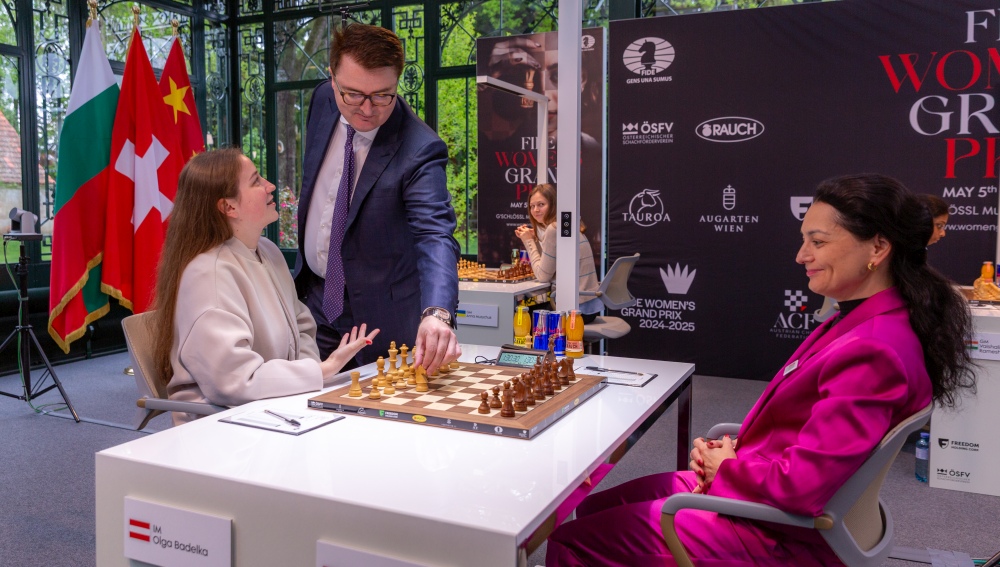
Round one saw a fiery start to the final leg of the 2024/2025 FIDE Women’s Grand Prix. IM Olga Badelka upset the former World Champion Alexandra Kosteniuk, Vaishali capitalised on Salimova’s time trouble and Tan emerged victorious as Black against Zhu in a marathon five-and-a-half-hour game. A strong start for the host country as Olga Badelka, representing Austria, defeated former World Champion Alexandra Kosteniuk. Despite being lower-rated and under time pressure, Badelka held her nerve and turned the tables in a sharp battle. One of the event’s favorites, Zhu Jiner, was under pressure and defended for a long time against Tan. Though both players missed chances in a complicated position, Zhu eventually cracked in a bishop vs rook endgame. Vaishali edged out Salimova in a balanced game, where better time management and control over the dark squares proved decisive. The Muzychuk sisters drew quickly in a short game. By contrast, Lela Javakhishvili and Nana Dzagnidze of Georgia fought for over five hours before agreeing to a draw in a grueling, evenly contested game. The tension at the start The small G’Schlössl Murtal in the southern Austrian hills was abuzz with tension as ten chess players arrived for the first round in the final battle of the Women’s Grand Prix. After clearing the Fair Play checks—which ensured no phones or electronic devices were brought in—the players took their seats. The venue, a picturesque orangery nestled in a tranquil park, offered a calming view as they settled in for round one. At 3 p.m. sharp, Chief Arbiter Gerhard Bertagnolli of Italy signalled the start of play. The President of the Austrian Chess Federation, Michael Stöttinger, made the ceremonial first move in the game between Austria’s Olga Badelka and former Women’s World Champion Alexandra Kosteniuk. As the clocks began to tick, the final leg of a six-tournament campaign was officially underway. But this Austrian stage will not be like the others. Instead, it will be the final verdict of the 2024/25 FIDE Women’s Grand Prix. Here’s a closer look at the games from round one. Olga Badelka vs Alexandra Kosteniuk, 1-0 The most exciting game of the round was played between the home player IM Olga Badelka (who commanded the white pieces) and GM Alexandra Koteniuk, representing Switzerland. Badelka chose the sharp Marshall Gambit in the Triangle Slav, signalling her intent to play for complications. In this well-known position, Kosteniuk has just snatched the g2-pawn with 9…Qxg2, which is considered to be very risky for Black. Unsurprisingly, the evaluation bar raced up for White immediately. The engine recommended the cold-blooded 10.Qd2—inviting Black to take the rook on h1 and walk into a likely ambush. Another well-known line starts with 10.Bf3 and also promises an advantage for White. However, Badelka played the more natural-looking 10.Qd6. After 10…Bd7 11.Bf3 Qg5 12.Rd1 0-0-0 Badelka, down two pawns, was compelled to keep pressing. The opponents traded errors in a very complicated position at this stage. Eventually, Kosteniuk grabbed her third extra pawn — emerging with a clear material advantage and a healthy lead on the clock. Badelka tried her last chance, throwing everything in, playing for time and trying to stay in the game. Somewhat surprisingly, it worked out for her! The last critical position emerged on move 35. Black is clearly better, but has to decide how to deal with her g7-pawn. Kosteniuk played 35…g6? (instead of the much stronger 35…g5!) which marked the beginning of her collapse. After 36.Qxh6 Rd4? 37.Qf8 Rd8? 38.h6 the tables have turned completely: White has advanced her h-pawn, regained the initiative and, within easy reach of move 40, escaped time trouble. The rest was a smooth sail for Badelka who won on move 43. The game was a fortunate break for the young Austrian IM. Despite being the underdog and in time trouble, she followed the cardinal rule: keep playing, don’t blunder, and survive to move 40. In the end, it was Kosteniuk who misplayed it all and lost. In the post-game interview, Badelka said she was “tired, excited and stressed” at the same time, noting that staying focused on the position and just wanting to “survive” kept her going. With just 25 points in the WGP, Badelka is not in contention for the top overall places. However, this victory is a welcome start for this event—not just for her, but also for Austria, as one of their own opens the tournament with a win on home soil. Vaishali Rameshbabu vs Nurgyul Salimova, 1-0 Roughly 10 minutes before Badelka sealed her win, India’s Vaishali Rameshbabu defeated Bulgaria’s Nurgyul Salimova. The youngest player in the tournament, 21-year-old Salimova, opted for the Caro-Kann and the opponents quickly entered uncharted waters. Vaishali grabbed advantage early on but played somewhat sluggishly, and with a timely move 14…c5, Black equalised. By move 19, the queens were off the board, but White had a slight edge thanks to a knight vs a “bad” bishop. At some point Salimova should have temporarily sacrificed her b3-pawn to activate her pieces, but she opted for a passive approach, allowing Vaishali to gradually take control. White is now winning. Soon, Vaishali captured the b3-pawn. With two queenside runners, it was a matter of technique—one Salimova didn’t care to test. She resigned on move 35. A great start for the Indian superstar in her third tournament of the year. Zhu Jiner vs Tan Zhongyi, 0-1 The longest game of the day – lasting five and a half hours – was played between one of the favourites Zhu Jiner, and former World Champion Tan Zhongyi. In the Classical Ruy Lopez, the opponents waged a protracted positional battle in a balanced game. A characteristic of this opening, but near the time control it turned into a real rollercoaster. The position is about equal, but both have to be very careful. 38.Nd6?? A serious mistake, handing Black a decisive advantage. After 38…Bxd6 39.Rxb5 Rxb5 40.exd6 Black emerged an exchange up, with a runner on the a-file and controls the main files. However, the
World Schools Team Championship Returns – this time in the USA!
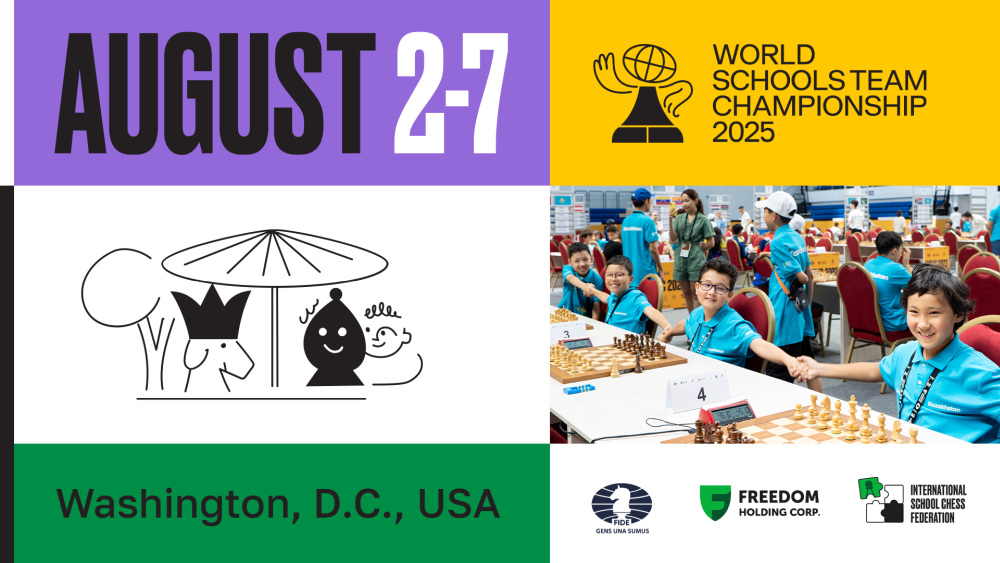
Following the resounding success of its inaugural edition in Kazakhstan, the FIDE World Schools Team Championship is back — and it’s set to be bigger and more global than ever before! The 2025 edition of this landmark scholastic event will take place from August 2-7 at the renowned Episcopal High School, approximately 11 km south of downtown Washington D.C.. Organized by FIDE in collaboration with the International School Chess Federation (ISCF) and proudly supported by Freedom Holding Corp., the championship invites teams nominated by their national federations, representing general educational institutions from all over the world. Specifically aimed at grassroots school chess clubs, the Championship marks another important step in FIDE’s long-term commitment to expanding global outreach for chess in schools. Building on the energy and spirit of the 2023 event in Aktau, Kazakhstan, this year’s championship promises even greater participation – with more countries, more teams, and more bright young talents coming together for a truly one-of-a-kind international competition. “The inaugural edition in Kazakhstan was a huge success – not just in terms of numbers, but in the atmosphere of excellence and team spirit that defined the event,” said Emil Sutovsky, CEO of FIDE. “In 2025, we’re taking it to the next level. We expect a record number of teams and look forward to welcoming young chess players from every continent. We are deeply grateful to Freedom Holding Corp. for their unwavering support and commitment. I’m especially excited about the introduction of the Smart Moves Summit, which expands the impact of this championship by bringing together global thought leaders to explore how chess can transform education and empower the next generation.” The tournament will be played over 8 rounds, in a Swiss format, with each team consisting of four main players, mixed age, one reserve and one non-playing captain. Time control is 45 minutes + 10 seconds per move, with two games per day across four action-packed days. Smart Moves Summit Beyond the board, the event will also host the Smart Moves Summit — a conference designed to spotlight the intersection of chess and education. Parents, school leaders, researchers, edtech innovators, chess-related businesses, marketing partners, officials, and many other chess enthusiasts from over 20 countries will come together to share insights, case studies, and future-forward ideas on how chess can shape learning environments and empower students. Expect inspiring keynotes from top chess influencers, visionary educators, and thought leaders in cognitive science. Take part in practical teacher trainings, interactive panels, and global school partnerships — all focused on how chess builds confidence, critical thinking, and deeper learning in today’s classrooms. “We wanted to go beyond simply organizing another chess tournament for children. Our goal was to bring together school teachers and experts from around the world to share their experiences and enhance their chess programs with fresh approaches and ideas. This parallel program ensures that coaches, parents, and guests also have a meaningful and enriching experience while their teams compete,” said Timur Turlov, President of the Kazakhstan Chess Federation, CEO of Freedom Holding Corp., and President of the International School Chess Federation. Venue: Episcopal High School Located just outside Washington, D.C., Episcopal High School offers a stunning campus with state-of-the-art facilities, historic architecture, and a strong tradition of academic and extracurricular excellence. It’s a perfect backdrop for a tournament that aims to inspire students to think critically, compete fairly, and connect globally. The World Schools Team Championship 2025 is a milestone on the international chess calendar – a place where future stars are born, friendships are forged, and school pride shines on the world stage. For federations and schools interested in participating, registration will open soon. All official invitations and procedures will be communicated through FIDE channels. For inquiries and further information: E-mail: worldschoolteam@fide.com

